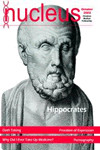In April Fiona Pinto and Joseph Biddulph, two pro-life candidates standing for election to the Welsh National Assembly, were arrested and charged with a public order offence after displaying a poster of a 21-week aborted fetus. At trial in September the arresting officer reported that, 'The general public demanded the poster be taken down and some ladies were in tears and visibly upset'. The prosecutor argued that free speech comes with a responsibility not to insult others and cause disorder, and that the pair had breached that duty.[1]
In clearing them of the charge Sally Ann Flemming-Jones, chair of the magistrates' bench, said: 'The bench takes the view that the poster is somewhat in poor taste. However, taken in light of modern day images used daily in the media, and with regard to the laws of freedom of expression, we do not find the charges of causing insult proved.'
Justifiable homicide?
On 4 September Florida State executed Paul Hill, a former presbyterian minister and high profile anti-abortion campaigner who shot dead the abortionist John Britton and his security escort in 1994. America has seen a total of seven deaths in attacks against abortion clinics, and there were fears that such activities would increase in the wake of Mr Hill's execution. In a press conference hours before his death he urged other campaigners to follow his lead, saying, 'If you believe abortion is a lethal force, you should oppose the force and do what you have to to stop it.' On his website he encouraged, 'You have a responsibility to protect your neighbour's life and to use force if necessary…may God help you to protect the unborn as you would want to be protected.'[2] Right until the end he showed no remorse; his supporters believe that the murders were 'justifiable homicide', and part of 'God's justice system', which 'calls for retribution.'[3]
Which way to turn?
The vast majority of Christians would react very strongly against these statements, and agree that Paul Hill brought shame on the pro-life movement. Yet if, as a Christian medic, you believe abortion is wrong and conscientiously object to involvement in abortions, is that the end point for you? Or does your duty stretch beyond that into some form of positive action? If it does, what should the content of that action be?
JS Mill in On Liberty asserted that '…the only purpose for which power can be rightfully exercised over any member of a civilised community, against his will, is to prevent harm to others…' The difficulty is defining what constitutes 'harm'. Is it harmful to make supporters of abortion feel guilt or shame about their activities, to make them question their belief and face the reality of what abortion actually does to an unborn human being? Does the arousal of these feelings constitute harm such that we shouldn't do it, or is it a truth that people need to face? Is it ever justifiable to use force to stop abortion happening, and if so are there any limits to that force?
A biblical response
The apostle Paul told the Christians in Rome that 'everyone must submit himself to the governing authorities'.[4] Yet there are some circumstances where those authorities attempt to force us to disobey God's clear instructions. Faced with this situation, and knowing that his response might result in his death, the apostle Peter said, 'We must obey God rather than men!'[5]
We should guard against a blanket response to all involved in abortion. Many women are caught up in abortion, often without support and not knowing what else to do. They need a compassionate response, as offered by crisis pregnancy centres such as those run by CARE.[6]
Yet surely we must do more than pick up the pieces: 'Speak up for those who cannot speak for themselves, for the rights of all who are destitute. Speak up and judge fairly; defend the rights of the poor and needy.'[7] We should be prepared to stand up against individuals, organisations and systems that work to make abortion easily available. Jesus did not shy away from speaking harsh truths when necessary; he asserted that truth was liberating,[8] but could also be divisive and cutting.[9]
Working actively to limit the scale of abortion must be on our agenda. Perhaps we could write in the medical, local or national press. Using shock tactics, like Pinto and Biddulph, may well be appropriate. The general public is often ignorant of how distasteful the abortion process really is, or ignorant that it is funded by taxpayers' money. The use of violence is, however, a different matter. Carrying the cross means that we are prepared to accept violence against us (as did the apostle Peter above), not that we will perpetrate violence against others.
Different Christians will draw the line at different points, but we should each think through what level of response God requires of us. When 180,000 unborn children die in the UK by abortion each year,[10] why are Christians not doing more to change this? Often it is not because a study of Scripture has led us to inaction; more often we simply lack the courage to put our heads above the parapet.
































